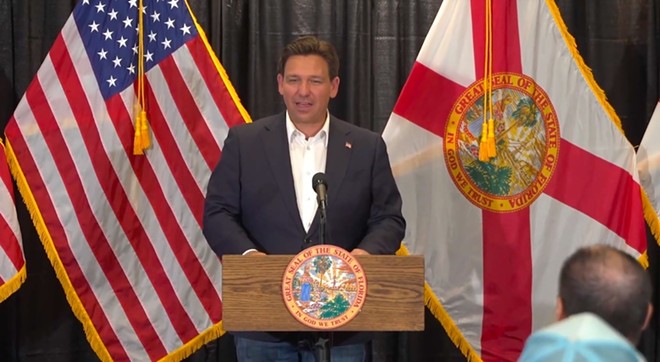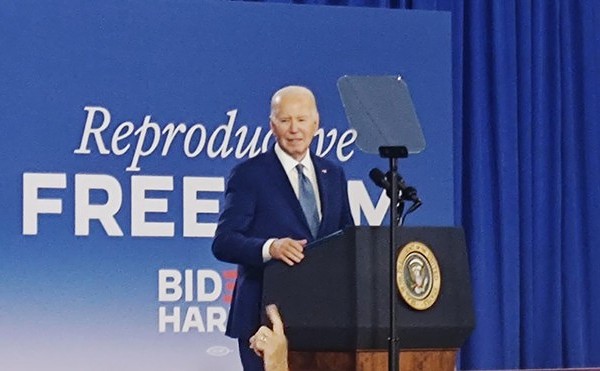“What they (state leaders) are tackling right now are some of the biggest challenges that we face in the Sunshine State, and that’s access to health care in a reliable, reproducible, sustainable kind of a way,” said Tampa General Hospital President and CEO John Couris, who took part in a bill-signing event in Bonita Springs. “We’re facing a myriad of challenges in the health-care industry, in the health-care system. There are critical shortages in the health-care workforce. We’ve seen an exceptional growth in labor costs. Patients are struggling to access the care they need, and the demand for behavioral-health services is at a record high.”
The bills were a priority of Senate President Kathleen Passidomo, a Naples Republican who dubbed them the “Live Healthy” initiative. Passidomo pointed Thursday to trying to meet health-care needs of a rapidly growing population.
“Unfortunately, the new Floridians are not bringing their health-care providers with them,” Passidomo said. “We’re going to change that. The good news is that Live Healthy will help grow Florida’s health-care workforce, increase access, incentivize innovation so Floridians can have more options and opportunities to live healthy here in the Sunshine State.”
DeSantis signed five bills, though much of the attention has focused on a wide-ranging measure (SB 7016) that includes $717 million in spending. The bill, for example, will provide money for increased residency slots for doctors and put additional dollars into loan-forgiveness programs for health-care professionals.
The bill also will take workforce-related steps such as helping clear the way for foreign-trained physicians to practice in Florida.
“Health care workforce is a challenge,” state Surgeon General Joseph Ladapo, who took part in the bill-signing event, said. “It’s tough to get appointments oftentimes, especially with specialty physicians. It’s tough to get a physical therapy appointment. It’s tough to see a nurse practitioner.”
The bill also includes issues such as trying to shift patients away from hospital emergency rooms for non-emergency conditions. It will require hospitals to take steps to divert patients such as by creating a “collaborative partnership” with federally qualified health centers or other primary-care providers.
The bill also includes allowing “advanced birth centers” that could provide cesarean-section deliveries for women who have what are considered low-risk pregnancies. Birth centers already exist but are not allowed to provide cesarean sections, which are surgical procedures done in hospitals.
Other bills signed Thursday included a measure (SB 7018) that will provide $50 million a year for a revolving-loan fund program for health-innovation projects. The program will provide loans with a maximum interest rate of 1 percent, with priority given to applicants such as rural hospitals and organizations that provide care in medically underserved areas.
Another bill (SB 330) will designate four behavioral-health teaching hospitals linked to universities to help address issues with treating patients for mental-health conditions.
The linked behavioral-health teaching hospitals will be Tampa General Hospital and the University of South Florida; UF Health Shands Hospital in Gainesville and the University of Florida; UF Health Jacksonville and the University of Florida; and Jackson Memorial Hospital in Miami and the University of Miami. The bill also will allow the state Agency for Health Care Administration to designate additional behavioral-health teaching hospitals as of July 1, 2025.
The bill will provide $100 million a year over the next three years to the teaching hospitals, with additional money provided for such things as residency positions for psychiatrists.
“I’ve said, look, I want more beds for mental-health patients, particularly people that are not able to function in society,” DeSantis said. “And so this is going to be, I think, a key component of that, and I think it’s something that’s going to be very, very meaningful.”
Other bills signed were a measure (SB 1758) that addresses programs and services at the Agency for Persons with Disabilities and a measure (SB 322) that creates a public-records exemption for certain health-care professionals.
The bills moved through the Legislature with almost no opposition, though Democrats repeatedly argued that the package should include expanding eligibility for Medicaid — an idea rejected for the past decade by Republican leaders.
Passidomo made clear as she began moving forward with the legislation that she would not consider expanding Medicaid.
“Access to health care is important at every phase of life,” Passidomo said Thursday. “Insurance, including Medicaid and Medicare, does not guarantee access. Even Floridians with great insurance face barriers to care.”
Subscribe to Orlando Weekly newsletters.Governor DeSantis Signs 'Live Healthy' Legislation https://t.co/M4En8GQQ2O
— Ron DeSantis (@GovRonDeSantis) March 21, 2024
Follow us: Apple News | Google News | NewsBreak | Reddit | Instagram | Facebook | Twitter | Or sign up for our RSS Feed



















